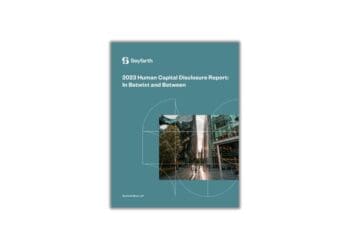(Sponsored) Sustainability is becoming a key driver in business and consumer decisions, and the Corporate Sustainability Reporting Directive (CSRD), part of the European Green Deal, is the latest continuation of this trend. The directive sets a new standard regarding non-financial reporting, demanding greater transparency on environmental, social and governance (ESG) issues. Considering the complexity of today’s global markets, the effects on manufacturers will be significant.
To fully appreciate the CSRD’s impact, we need to first understand the concept of “value chains.” While the term “supply chain” focuses on the upstream of a company’s operations, meaning where raw materials are sourced and how they are transformed into products, the value chain includes downstream processes as well.
The value chain also includes direct activities involved in creating a product and their supporting functions. Let’s look at the creation of a smartphone. In this example, the value chain would include the mining for metal ore, the manufacture of the phone and the software development that makes it functional. But that’s not all — the value chain would then extend to the teams that market and sell the phones, and even support services.
This view of a business, which takes the widest lens possible, helps companies improve efficiencies and address the environmental and social effects at each stage of the product journey.
Unpacking the CSRD
Given this context, it’s easy to see that the CSRD marks a significant step in how the European Union is attempting to regulate businesses. There will now be uniform expectations for how companies should report on ESG topics across the entire value chain. These new expectations mean that businesses will have to use the European Sustainability Reporting Standards (ESRS) for compliance. They will also have to conduct double materiality assessments, which help companies identify impacts, risks and opportunities related to ESG topics.
These assessments are referred to as “double materiality” because their focus is multi-faceted instead of singular. First, the assessment must examine the company’s external impacts on the environment and society, meaning how their operations affect everything from local communities to the climate. Second, it must look at how ESG factors impact the company’s financial and operational performance. And in both cases, the company needs to review information from financial and non-financial perspectives. For example, this could include assessing the risks climate change poses to their supply chain.
This push toward more standardized and mandatory reporting of non-financial data ensures that stakeholders, investors and the public get a clear and easy to understand view of ESG efforts. The aim is clear: to enhance transparency and drive sustainable business practices that are both measurable and reportable.
Expanding UFLPA Enforcement: Strengthening Supply Chains Against Forced Labor Risks
A U.S. House committee has urged a more aggressive stance on goods imported from a restricted region in China amid human rights concerns. Assent's Jamie Wallisch shares insights for companies struggling to manage the supply chain risks.
Read moreHow the CSRD redefines reporting
The CSRD is groundbreaking in a few ways. First, it marks a significant shift in how companies approach and standardize their framework for ESG reporting. Imagine managing an entire orchard rather than just focusing on one apple tree. While most regulations in the past have focused on one issue — like forced labor, for instance — the CSRD requires companies to examine ESG performance across a broad range of topics. To return to the metaphor, this means looking at every tree in the orchard to find signs of disease or pests and then, if necessary, taking action to minimize negative effects on the whole orchard.
Another unique feature of the CSRD is the introduction of digital tagging for sustainability reports. Going forward, companies will need to tag sustainability information and compile it in a uniform format, which will make it much easier for anyone to find, compare and analyze data.
Finally, there’s also the fact that reports will now have to be verified by a third party. While companies have always been able to opt for this level of oversight, it will now be a requirement, meaning the bar for non-financial reporting has been raised — and companies that don’t act now to meet these new expectations will fall behind.
Impact on supply chain sustainability management
The CSRD is set to change how companies manage value chain sustainability, especially the supply chain, as a good portion of a company’s ESG risk lies in the upstream. While compliance has typically been the responsibility of one department, it will now require input from across the organization, including finance, human resources and procurement.
It’s no longer enough for each department to focus solely on its individual impact. Instead, finance teams will need to factor ESG considerations into decisions, and the HR department will need to think about the social implications of their decisions. No aspect of a business will be immune from playing a role in CSRD compliance, and this cross-departmental collaboration will also be crucial for identifying and addressing risks scattered throughout the value chain.
First step toward compliance
As manufacturers prepare for CSRD compliance, a crucial first step is to fully understand the ESRS. These standards, developed and updated by the European Financial Reporting Advisory Group (EFRAG), are key to meeting CSRD requirements. Manufacturers need to stay updated on these standards, along with other relevant reporting standards essential for CSRD compliance.
For manufacturers already aligned with the Global Reporting Initiative (GRI), the transition might be smoother. The ESRS and GRI standards are largely aligned, which means that manufacturers previously committed to GRI standards might find that much of their existing framework also meets the ESRS requirements.
The time to start is now
Compliance with the CSRD is about safeguarding against significant risks, including financial penalties and reputational damage. Meeting requirements requires alignment with the ESRS and setting up an effective supply chain sustainability management program, which is a resource-intensive task. Starting early will better position companies to make meaningful improvements that resonate with stakeholders and consumers alike. Learn more about how you can take action now, while it’s still possible to turn new obligations into a strategic advantage.




 Jamie Wallisch is a regulatory and sustainability expert for Assent. She helps customers proactively assess their supply chains for sustainability issues and provides ESG regulatory guidance through enhanced supplier screening. She uses her in-depth experience working in responsible sourcing, including working closely with the U.S. Department of Labor, to provide insights into ESG topics like human and labor rights, climate impact, ethical concerns, responsible sourcing and trade trends. Her work with Assent has even brought her to the Democratic Republic of the Congo to understand the downstream impact to customers. Jamie was also named a finalist for the Next Generation Leadership Award from the Manufacturing Leadership Council and is serving as co-chair of the Social Responsibility Alliance for 2024.
Jamie Wallisch is a regulatory and sustainability expert for Assent. She helps customers proactively assess their supply chains for sustainability issues and provides ESG regulatory guidance through enhanced supplier screening. She uses her in-depth experience working in responsible sourcing, including working closely with the U.S. Department of Labor, to provide insights into ESG topics like human and labor rights, climate impact, ethical concerns, responsible sourcing and trade trends. Her work with Assent has even brought her to the Democratic Republic of the Congo to understand the downstream impact to customers. Jamie was also named a finalist for the Next Generation Leadership Award from the Manufacturing Leadership Council and is serving as co-chair of the Social Responsibility Alliance for 2024.








